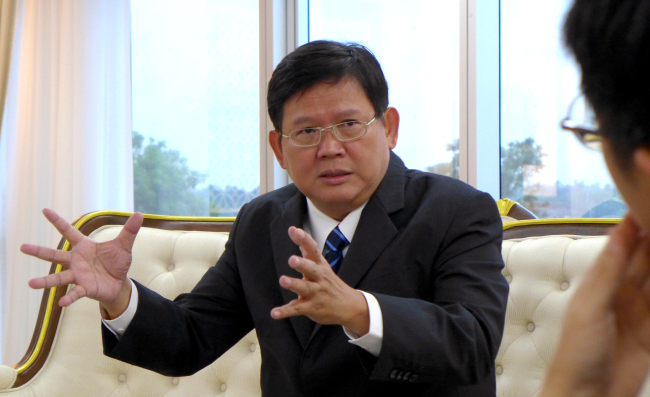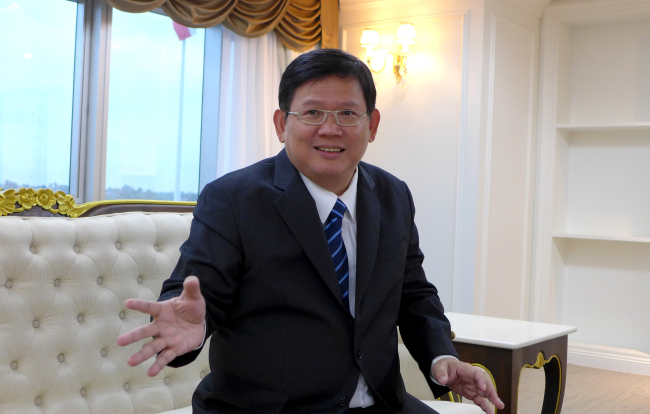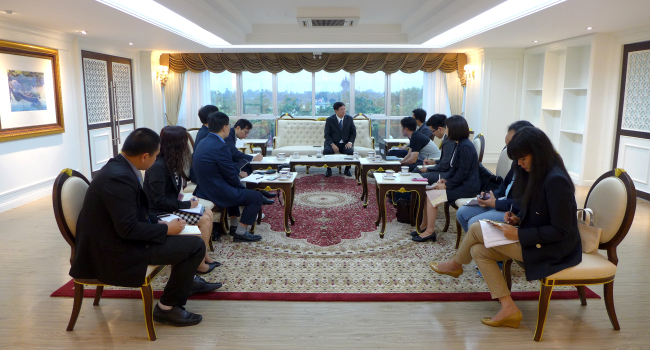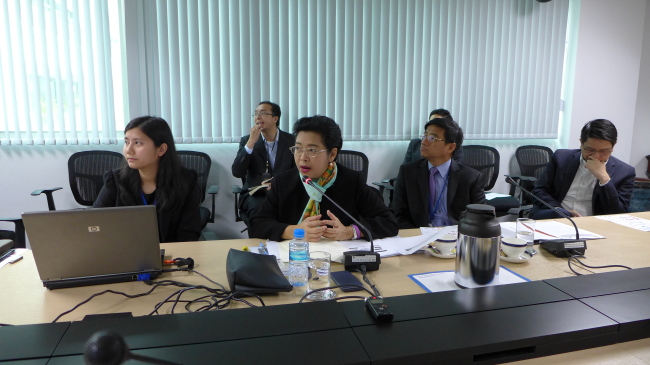BANGKOK -- Thailand, once perceived to be Southeast Asia’s low-cost manufacturing hub, aims to rebrand itself as the region’s leader in the knowledge-based economy.
In line with the government’s “Thailand 4.0” restructuring initiative, Bangkok is transforming the country into an entrepreneurial hot spot of information and communication technology, culture and tourism, creative industries, smart farming and advanced manufacturing.
In April, a delegation of seven Thai ministers led by Deputy Prime Minister Somkid Jatusripitak visited Korea to elicit the support of the Korean government and private sector. Jatusripitak met Korean President Park Geun-hye and discussed invigorating ties in trade, investment, tourism, infrastructure and technology, which are currently being formulated on both sides.
As a follow-up of the ministerial visit, Korean journalists toured Thailand in late September to witness and report on the untapped potential for investment and exchange.
 |
Thai Deputy Commerce Minister Suvit Maesincee speaks to Korean journalists at the Ministry of Commerce in Bangkok in late September about the reform and restructuring drives undertaken by the Thai government to shore up the country’s economic competitiveness in the world economy. (Joel Lee/The Korea Herald) |
“Thailand and Korea need to collaborate more on our strategic partnership and build stronger relationships across government, the private sector as well as with people,” Thai Deputy Commerce Minister Suvit Maesincee told reporters in Bangkok.
“With the world economy slowing down, Thailand and Korea face the urgency of structurally reforming our economies and industries to enhance our productivity. We cannot rely on trade as in the past. We need to identify new engines of growth for our mutual prosperity.”
Korea is Thailand’s eighth-largest trading partner with $11.2 billion in bilateral trade last year. In terms of tourism, it sends the fourth-most foreign tourists to the country, with nearly 1.4 million Koreans traveling there last year.
Over 300 Korean companies currently operate in Thailand in manufacturing, sales, logistics, services, cosmetics, ICT and food and beverage. Bilateral economic cooperation has remained relatively low over the years, particularly since 2012 when political issues destabilized the country.
Korean investment in the second-largest economy of the Association of Southeast Asian Nations has been relatively weak due to the strong presence of Japanese firms, Korea’s preference for Vietnam, Indonesia and Myanmar, the perception of Thailand mainly as a tourism destination, the lack of symbolic projects and the absence of Korean banks, according to the Korea Trade-Investment Promotion Agency.
 |
Thai Deputy Commerce Minister Suvit Maesincee speaks to Korean journalists at the Ministry of Commerce in Bangkok in late September about the reform and restructuring drives undertaken by the Thai government to shore up the country’s economic competitiveness in the world economy. (Joel Lee/The Korea Herald) |
To reverse the low investment, the bureaucrat said his government has laid out a clear vision for national development, upending the past policy of welcoming investment without a guided direction.
“The purpose of our old approach was to attract foreign investment for increasing export, part of an import substitution industrialization strategy,” he said, referring to the trade and economic policy that advocates replacing imports with domestic production to reduce foreign dependency.
“Now the situation has changed. With the world economy losing steam, we cannot rely on export as we used to. That is why we are reforming our government and country toward ‘Thailand 4.0.’”
Thailand 4.0 is part of the 20-year National Strategy for sustainable development, aimed at bolstering its competitiveness and avoiding the “middle income trap.” Bangkok has announced its 12th National Economic and Social Development Plan (2017-21), intended at shoring up the services sector; incorporating globalization into regional development; reducing socioeconomic inequality; preparing for an aging society; investing in new technologies; fostering green growth; and improving bureaucratic efficiency.
“Thailand 4.0 is about fundamental change, about transforming the mindset as well as skills set of people, rebuilding the ecosystem, reducing economic inequality and avoiding the middle income trap,” according to Maesincee.
 |
Thai Deputy Commerce Minister Suvit Maesincee speaks to Korean journalists at the Ministry of Commerce in Bangkok in late September about the reform and restructuring drives undertaken by the Thai government to shore up the country’s economic competitiveness in the world economy. (Joel Lee/The Korea Herald) |
Of importance to Korea, he added, stronger cooperation can occur in the digital economy, creative economy, bio-economy and advanced industrial economy.
Transforming the digital economy requires digitizing manual means of production across all industries, encompassing infrastructure, communications networks, agriculture and manufacturing.
“The two countries can join hands in the creative economy by merging culture, technology, commerce and tourism together, as well as in bio-economy centered on food and agriculture, health care and wellness,” he said. “The advanced industrial economy encompasses robotics, automatic technologies and mechatronics, among others.”
Thailand has collaborated with the world’s leading educational institutions in the bio-medical and engineering spheres to build the Food Innopolis -- a global food innovation hub focusing on research and development of the food industry, located inside the Thailand Science Park in Bangkok.
The Korea Advanced Institute of Science and Technology, the country’s leading engineering school, has worked closely with Thai universities in mechatronics, biomedical engineering, biotechnology, service design and embedded technology.
Furthermore, Korea’s largest steel manufacturer Posco has invested in ICT projects in Thailand, while Samsung Electronics has shown interest in investing more in the country.
Yello Mobile -- a Korean firm mobile apps business that operates in online shopping, media, marketing and advertising, tourism and online-to-offline commerce -- is seeking strategic partners in Thailand, which can inspire the country’s startups, Maesincee argued.
 |
Thai ministry of commerce in Bangkok (Joel Lee / The Korea Herald) |
“We are trying to move up the income ladder and become a high-income country by working together with companies and talents from around the world,” he said. “This is about creating a digital platform and ecosystem that incorporates small and medium-sized enterprises. Thailand needs to become an innovation-driven economy from an efficiency-driven one.”
There are many ongoing and devised agriculture and infrastructure projects in northeastern Thailand where Korean investment is needed, he mentioned, adding Thailand has invested heavily in resource-based infrastructure, particularly hydropower; connectivity-based infrastructure, such as logistics and transport; knowledge-based infrastructure of research and development centers and schools; and social infrastructure covering welfare and social security.
The two governments have started cooperating on the Lower Huai Luang River Basin Development Project through a joint working committee, and have held discussions on how to move forward railway cooperation along the East-West Economic Corridor in Thailand. The country welcomes Korean investment in projects such as the Bangkok-Rayong High Speed Train and Yellow and Pink MRT Line in Bangkok, according to the Thai Ministry of Foreign Affairs.
Of particular importance to Thailand, the four developed industrial estates southeast of Bangkok, comprising the “Eastern Economic Corridor” -- Pin Thong Industrial Estate in Chonburi province, Hemraj Eastern Seaboard Industrial Estate, Amata City Industrial Estate and Rayong Industrial Estate in Rayong province -- are ripe for Korean investment, the ministry officials said.
 |
Thai diplomats of the East Asia department at the Ministry of Foreign Affairs in Bangkok (Joel Lee / The Korea Herald) |
Highlighting Thailand’s neighboring countries have become market economies from previous socialist economies, the minister said the country needs “strength from within” to compete and cooperate with them.
“Thailand has the potential to become the gateway to ASEAN, particularly Cambodia, Vietnam, Laos, Myanmar and Malaysia that surround us,” he said. “We treat these neighboring countries as partners rather than competitors. By working with the economies and peoples of this region collectively, we are also endorsing our products as being ‘Made in ASEAN.’”
Noting there are over 20 large-scale metropolises and 15 secondary cities in these countries, the minister emphasized Bangkok supports city-to-city cooperation within the integration of ASEAN -- home to over 633 million people with the world’s seventh-largest gross domestic product of $2.1 trillion.
With the launch of the ASEAN Economic Community this year, which would boost the region’s economic capacity as an integrated production base, he added that regional cooperation between Southeast Asia and Northeast Asia is becoming increasingly important.
Thailand offers affordable office occupancy costs, the most competitive in the Asia-Pacific; low corporate taxes, the second-lowest in ASEAN after Singapore at 20 percent; low-cost public utility rates for electricity and hydro; high infrastructural connectivity; 12 internationally competitive airports and eight deep seaports; 26 industrial clusters; and a well-trained workforce, according to the Thailand Board of Investment.
By Joel Lee, Korea Herald Correspondent (
joel@heraldcorp.com)












![[Today’s K-pop] Blackpink’s Jennie, Lisa invited to Coachella as solo acts](http://res.heraldm.com/phpwas/restmb_idxmake.php?idx=644&simg=/content/image/2024/11/21/20241121050099_0.jpg)